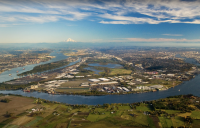On February 14, 2023, the fossil fuel industry and Montana filed a lawsuit challenging the City of Portland’s Fossil Fuel Terminal Zoning Amendments.
City of Portland’s Fossil Fuel Terminal Zoning Amendments FAQ
What are Portland’s Fossil Fuel Terminal Zoning Amendments?
The City of Portland’s Fossil Fuel Terminal Zoning Amendments are rules that limit new or expanded bulk fossil fuel storage facilities and shipping terminals and limit the expansion of existing bulk fossil fuel terminals.
Why does Portland need these rules?
The rules are important because they reduce health, safety, and environmental risks in the event of an accident or catastrophe—like an earthquake. More than 90% of Oregon’s liquid fuel, including aviation fuel, is stored in a six-mile industrial area in NW Portland along the Willamette River. This area is a liquefaction zone, meaning that the soil will liquify during a large earthquake. Source: Multnomah County.
Additionally, the air pollution from transporting and storing these fuels and hazardous chemicals is dangerous for workers on site and residents who live nearby.
How do Portland’s rules protect the Columbia River?

Portland’s rules are a necessary first step to protecting communities and water quality from dangerous fossil fuel infrastructure. Portland sits at the confluence of the Willamette and Columbia rivers, so pollution from any large spill in the City would likely reach the Columbia.
In the event of a major earthquake, the existing storage tanks along the Willamette River in Portland would spill between 94.6 million and 193.7 million gallons of oil and other petroleum products—equal to the 2009 Deepwater Horizon spill. Source: Multnomah County. Protecting this stretch of river is extremely important for Portlanders, salmon migration, and the numerous sovereign Tribal Nations that have protected these waters since time immemorial.
Didn’t the fossil fuel industry already challenge Portland’s rules?
Yes. The fossil fuel industry has challenged Portland’s rules three times in state court. Twice, Portland’s rules were sent back and re-adopted by the City Council with additional reasoning and evidence. The third challenge is ongoing. Columbia Riverkeeper has intervened in all three challenges to defend Portland’s rules.
What makes this new lawsuit different?
This new case, brought by different fossil fuel industry groups and Montana, is in federal court. The fossil fuel industry is arguing that Portland’s rules violate the U.S. Constitution by discriminating against out-of-state fossil fuel businesses. Because this case is in federal court, a bad ruling could stop cities throughout the region from protecting their residents by limiting the expansion of fossil fuel infrastructure.
Have we seen these arguments before?
Essentially, yes. The Oregon Court of Appeals rejected one of the main arguments in this federal case. Specifically, the Oregon Court of Appeals found that the alleged burdens on interstate commerce posed by Portland’s rules did not outweigh the important local benefits:
“. . . [W]e conclude that the amendments provide legitimate putative local benefits, which include limiting the number of very large fossil-fuel terminals in a moderate- to high-risk earthquake liquefaction zone. The amendments also seek to reduce the risk of potential explosions, accidents, and fire at large fossil-fuel terminals and to reduce the similar risk of a catastrophic accident from the larger trains that transport fossil fuels to the terminals. In addition, the amendments seek to protect local public health and limit exposure to coal containing heavy metals linked to cancer, birth defects, and other problems.” Columbia Pacific v. City of Portland, 289 Or App 739, 752 (2018).
A federal court could come to a different conclusion, however.
What’s next?
The City’s response to the lawsuit is due in mid-April 2023. Columbia Riverkeeper and other groups are evaluating whether to support the City by intervening in the case or filing a supportive amicus curiae (“friends of the court”) brief.
Big Picture:
Despite huge victories against new fossil fuel development along the Columbia River—as well as local, state, and federal laws designed to reduce reliance on fossil fuels—the fossil fuel industry and their captured politicians are still looking for ways to push dirty, dangerous fuels into our communities. Lawsuits are just one tactic the fossil fuel industry uses to hinder efforts to make our communities safer. Columbia Riverkeeper is committed to fighting back and identifying the fossil fuel industry’s false solutions.
Support Clean Water Become a member today


